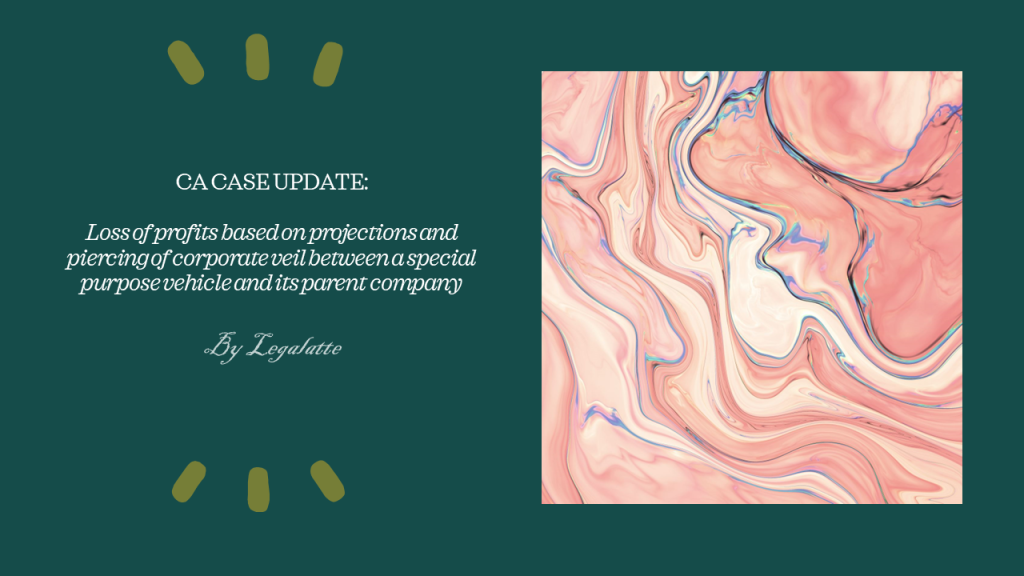A. Introduction
This is a case update on the Court of Appeal decision in Lembaga Tabung Haji & Anor v Encap Sdn Bhd. This article highlights two interesting points.
First, the Court can grant loss of profits or expectation loss based on projections.
Second, the piercing of corporate veil need not be specifically pleaded. The Court can pierce the corporate veil between a special purpose vehicle and its parent company. This is because the special purpose vehicle owes a fiduciary duty to its parent company.
B. Background Facts
The 1st Appellant, Lembaga Tabung Haji (“LTH“) is the 1st Defendant in the High Court. The 2nd Appellant, Premia Cards Sdn Bhd (“Premia“) is the 2nd Defendant in the High Court. The Respondent, Encap Sdn Bhd (“Encap“) is the Plaintiff in the High Court.
LTH and Encap initially entered into an agreement for Encap to provide LTH with ATM debit cards. This agreement will be referred to as the Debit Card SPA. There were subsequent variations to this contract.
There came a requirement of a Bank Negara Malaysia (“BNM“) license to be obtained for MasterCard debit cards to be issued. LTH incorporated Premia to obtain this license. Pursuant to BNM’s suggestion, parties were working towards obtaining license for prepaid cards to be issued instead.
A draft agreement was circulated for the issuance of the prepaid cards. This draft agreement will be called the Draft Prepaid Card SPA. Although the BNM license was obtained for this, this draft agreement was never signed. The transaction of the issuance of the prepaid cards was successful.
Subsequently, LTH terminated the Debit Card SPA on the ground that Premia failed to obtain the necessary BNM license for the debit cards. At this juncture, Encap had already spent RM12 million for work done on the initial Debit Card SPA, and subsequently the Draft Prepaid Card SPA. It had also been projected that Encap would be paid RM42 million if the project was successful.
Encap commenced proceedings against LTH and Premia in the High Court. The High Court awarded Encap the sum of RM42 million (as expectation loss). The basis upon the High Court Judge’s ruling is quantum meruit under section 71 of the Contracts Act 1950. However, the issue was neither pleaded nor submitted by the parties. LTH and Premia appealed against this decision.
C. Court of Appeal’s Decision
(i) Preliminary issues on quantum meruit
The Court of Appeal held that it is wrong for the High Court to award damages for quantum meruit. This is for two reasons. First, it is an unpleaded issue. Second, quantum meruit can only be awarded if there is no contract between the parties.
The Court of Appeal posed two preliminary questions on the parties:
(i) What is the stand of the Appellants and the Respondent in respect of existence of contract between the Appellants and the Respondent?
(ii) If the Appellants / Respondent stood on the position that there was a contract entered into between the parties, then the next question is, was it appropriate for the Learned Judge to ignore the parties’ pleadings and submission and rely on section 71 of the Contracts Act 1950 (‘the Act”) on his own accord whereas section of 71 of the Act (award of quantum meruit) would only be applicable if there was no contract entered between the disputing parties?
The parties had agreed not to pursue these issues.
(ii) Unlawful termination of the Debit Card SPA and the binding effect of the Draft Prepaid Card SPA
The Court of Appeal formulated three key issues in determining the appeal before the Court. The issues are (i) the validity of LTH’s termination of the Debit Card SPA; (ii) the binding effect of the Draft Prepaid Card SPA; and (iii) the validity of the award of loss of profits based on projections.
This article will not dive into the first and second issues, save to say that the Court of Appeal held that the Debit Card SPA was unlawfully terminated, and the Draft Prepaid Card SPA was binding on the parties, given that the parties performed the obligations under the draft SPA.
(iii) Award of expectation loss based on projections is upheld
At the outset, the Court of Appeal set out the principles relating to reliance loss and expectation loss.
Reliance loss is the loss of expenditure. Parties claiming reliance loss are essentially claiming for restitution i.e parties will be put in a position as if the contract was never entered into. Expectation loss is the loss of profits. It puts the parties in a position as if the contract is successfully completed. Parties can only claim for one of the two types of loss. When expectation loss cannot be proven, the Court can award reliance loss in the alternative.
LTH and Premia took issue with the High Court Judge’s award of expectation loss of RM42 million to Encap, on the ground that it is premised on projections. Although the general rule is that mere projections are not valid proof of damages, the Court of Appeal nevertheless upheld the award of expectation loss for the following two reasons.
First, the sum of RM42 million was LTH and Premia’s own calculation of what Encap would have earned if the project is successfully completed. LTH and Premia submitted their projection of Encap’s potential revenue to BNM when applying for the license for the prepaid cards.
Second, there was a clear mathematical methodology in LTH and Premia’s projection of Encap’s revenue.
This shows that projected loss of profits can still be allowed if (i) throughout the transaction between parties, the projected or estimated profits had been accepted and admitted; or (ii) there is some valid basis in the calculation of the estimated profits.
(iv) The flexibility in piercing the corporate veil is expanded
LTH and Premia also took issue with the High Court Judge’s ruling on joint and several liability against them. This is because Encap had never pleaded for the corporate veil to be pierced between LTH and Premia.
The Court of Appeal upheld the High Court Judge’s ruling and expanded the flexibility in the piercing of the corporate veil between LTH and Premia. The Court of Appeal held that Encap did not need to specifically plead for the piercing of the corporate veil. The fact that Premia is specifically incorporated to obtain the BNM license for LTH shows that they do not operate on equal footing and Premia owed a fiduciary duty to LTH. As such, the corporate veil between these two entities could be pierced.
This is an interesting finding by the Court of Appeal as it broadens the categories under which a corporate veil can be pierced, and corporations can now owe fiduciary duties to one another.

